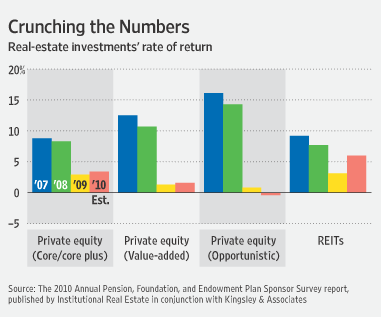REITs Versus Real Estate Private Equity Funds Who Wins
Post on: 9 Июнь, 2015 No Comment

Earlier this year, Ernst & Young held a workshop in London for about 300 real estate clients from Europe, the Middle East, India and Africa. One of the liveliest sessions featured a debate, moderated by Dean Hodcroft, an EY partner and head of real estate in the region. The question posed for the debate: “This house believes that real estate private equity will always outperform the listed real estate sector in normal market conditions.” Teams representing private equity and the listed sector fiercely debated their point of view.
The Private Equity team made key arguments that PE is better for a number of reasons:
- Private equity can be nimble, having more ability to buy at the bottom of the market, sell at the top.
- Opportunistic buying makes sense, because cycles don’t track uniformly by asset class or geography.
- Opportunistic funds can go where the opportunity is. REITs are limited by focusing on asset class or geography.
- Private equity is better managed and aligned: general partners are highly invested and, so, focused on achieving high returns.
- Private equity is disciplined by its focus on achieving a successful exit.
- There is no mystery about PE compensation (annual management fees plus carried interest), and it is correlated to performance.
- The listed sector has a number of perceived weaknesses: There is a lack of alignment between management and performance, there are endless committees and regulations — it takes a long time to reach decisions, and liquidity is illusory — only big REITs are liquid.
- And, finally, PE uses more leverage, so it should be able to outperform the listed real estate sector.
The REIT team made the following case for its sector:
- REITs have operational expertise in the real estate market, as well as systems — they don’t take advantage of fads.
- REITs are domestic — they are focused, rather than attempting to cover the globe and enter markets they don’t really understand.
- REITs have access to capital at all times in the market cycle, whereas PE does not.
- REITs have liquidity.
- REITs invest in the broad market, unlike PE.
- REITs operate in a regulated framework and investors take comfort from that.
- REITs have to stay close to their stated strategy.
- Governance is high in REITs — remuneration committees report openly, whereas PE remuneration can be unclear.
- REITs are subject to three-monthly valuations by external valuers — PE has less regular valuations, and many are internal.
- REITs are less constrained in terms of exit date.
- Private equity needs to manage the potential moral hazard — PE managers want to invest money fast but they are also the guardians of investors’ interests.
- The ultimate sanction for REITs is that they operate in an open market — the market can change the management if it chooses; in PE, the management is there to stay.
- There is some truth that listed real estate is driven partly by underlying stock market sentiment rather than real values. However, real estate stocks are highly correlated with the underlying real estate market.
- The PE market depends on maximizing leverage. The listed sector therefore delivers a higher absolute return with lower leverage and lower risk.
Asked how they would choose to invest following the debate, 69 percent of conference delegates backed private equity. However, asked which team won the debate, 52 percent voted for the listed sector team — an even- handed outcome.
What’s your view?














